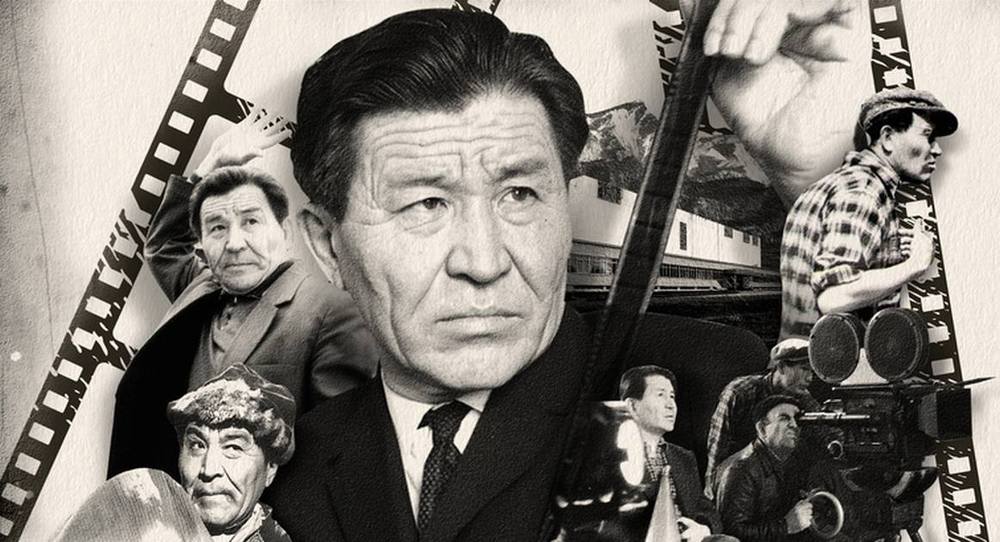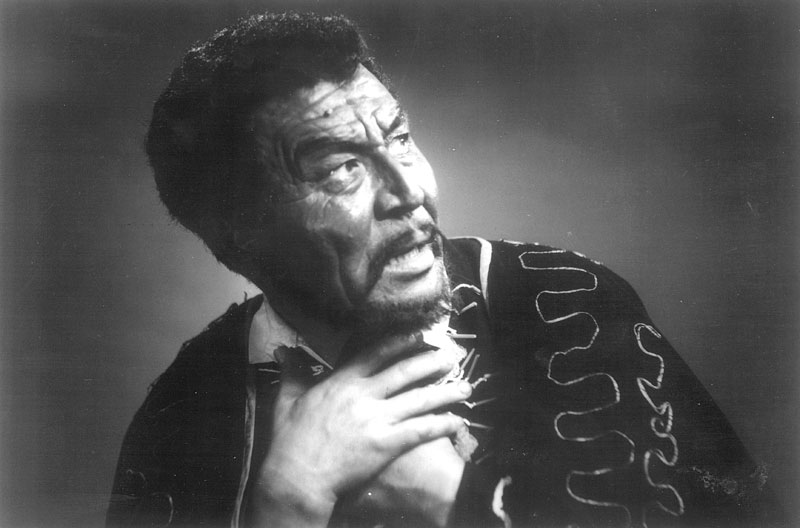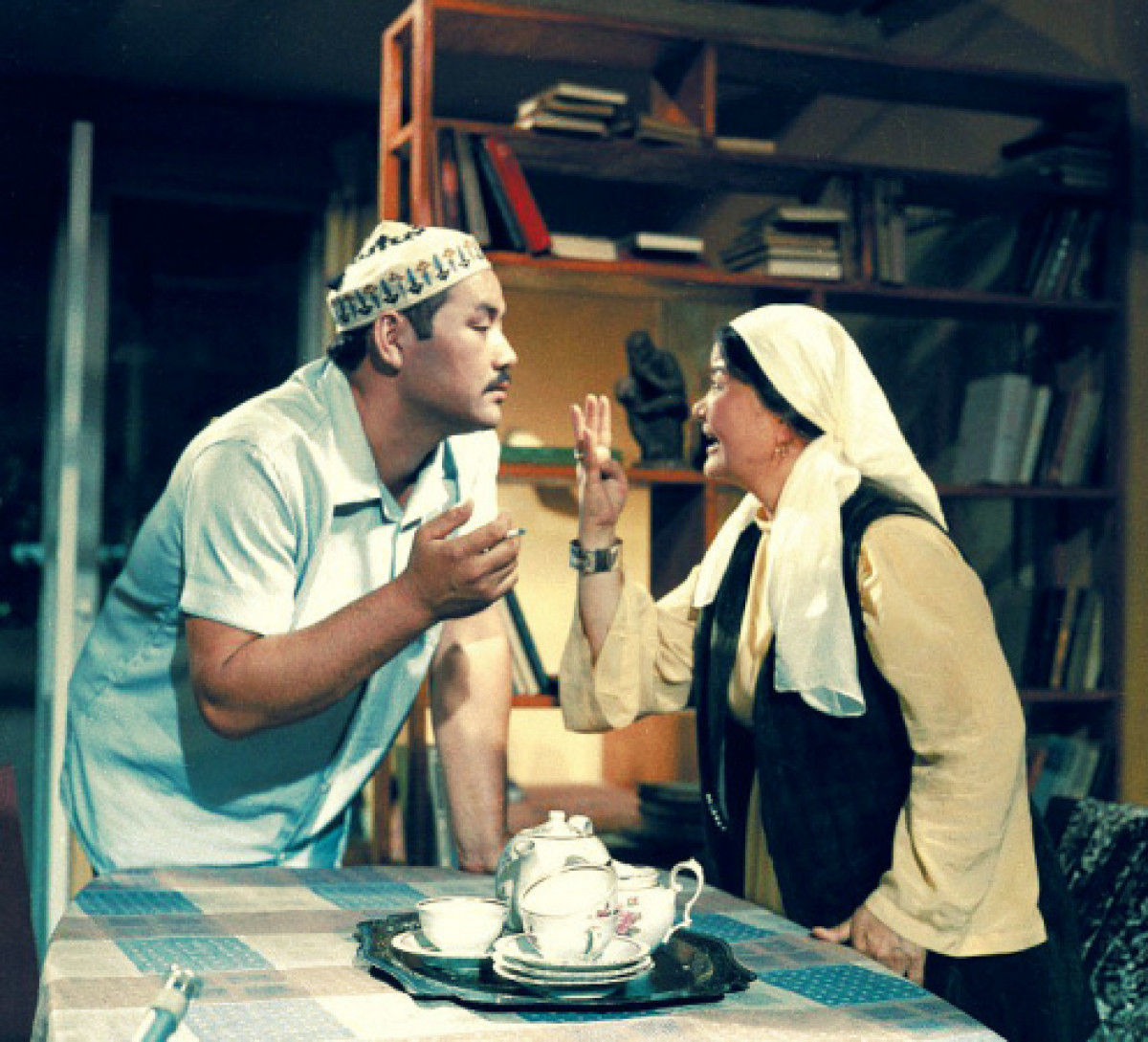ASTANA – Kazakhstan celebrates 110 years of Shaken Aimanov, the acclaimed and versatile Kazakh director, on Feb. 15. Throughout his long career, Aimanov combined light entertainment comedies with topical films that appealed to him on a deeply personal level.

Collage credit: kazakhcinema.kz.
The director and actor with a kaleidoscopic career, he became an outstanding technician in cinema as well as a leading practitioner in theater.
Early life
Aimanov was born in 1914 in Bayanauyl village in the Pavlodar Region in the family of a herdsman. Shaken is short for Shakkarim, a name he received at birth.
He went to the Kazakh Pedagogical Technical School in Semei in 1931. There, Aimanov was spotted by the writer Gabit Musrepov, the head of the Arts Section of the People’s Commissariat of the Kazakh Soviet Socialist Republic (SSR). The writer came to Semei in search of young people to join the troupe of the Kazakh State Academic Drama Theater. Aimanov stood out to him for his ability to improvise and project confidence on stage.
After graduating in 1933, Aimanov traveled to Almaty upon Musrepov’s invitation, where he landed an acting job at the Kazakh State Academic Drama Theater that set off his theater career. He worked in the theater until 1953 and served as a chief director and artistic director during 1947-1951.
Theater roles
In theater he became an esteemed actor, playing over 100 versatile characters from William Shakespeare’s Petruchio and Othello to Sharip in Mukhtar Auezov’s “Abai.”

Shaken Aimanov as Othello. Photo from open sources.
Aimanov’s Othello was his star role. One of the best performers of the Othello role, the Englishman Laurence Olivier, saw Aimanov’s part as the apex of an actor’s career and a testament to his maturity and depth of talent. They met in 1964 when Aimanov was invited as part of a Soviet delegation to celebrate Shakespeare’s 400th anniversary in his homeland. Olivier asked him to recite something Shakespearian in Kazakh language and Aimanov read Othello’s monologue from the large stage in England.
Then came Boris Bibikov and Olga Pyzhova’s staging of “The Taming of the Shrew,” a caustic and amusing comedy by Shakespeare, in which Aimanov played mischievous and hot-tempered Petruchio working in a duet with Khadisha Bukeyeva. Full of light jokes, rabid temperament, and gentle human warmth, Aimanov’s Petruchio sets the tone of the play.
“What does the play captivate the audience with? Apparently, Shakespeare himself is primarily to blame. His creativity goes beyond the boundaries of one national culture. Shakespeare is universal,” said Aimanov in one of his radio interviews.
The newspapers of those days reported “The Taming of the Shrew” as “the two hours of joy and celebration.”
Even as his film-directing and acting career prospered, Aimanov kept his presence at the theater with a string of superb new roles.
Film acting career
After a four-year stint at the theater, in 1937, Aimanov plunged into the film industry with a small role in the film dedicated to revolutionary Amangeldi Imanov. But it was not until he played the lead part in “Dzhambul,” a film portraying the prominent Kazakh poet Dzhambul Dzhabayev, that Aimanov decided to commit to filming.

“Angel in takiya” film. Photo credit: gakku.kz.
“After working on the ‘Dzhambul’ movie, the film industry attracted me more and more and arguments with the director about the interpretation of the image led to an absurd thought: ‘What if I try to direct the movie myself?’ And although I staged several performances in the theater and even received the Abai State Prize, I could not dare to switch to directing so immediately. The specifics of the movie seemed too complicated to me at that time. But I did become a movie director, after all,” said Aimanov.
Aimanov – director
Aimanov’s modest and affable manner, excellent casting and spot-on use of music enabled him to turn simple stories into widely loved films.
In one of his most remarkable films, “Angel in a Takiya” (takiya – a rounded skullcap) Aimanov celebrated true love and embraced the complexity of a mother-son relationship.
The main character is a geography teacher, Taylak, who always wears a takiya. The story about a very good-natured but lonely man whose mother constantly tries to set him up with young women to marry is both moving and funny.
It is said that Aimanov drew inspiration for the script of the “Angel in a Takiya” from real life: his own relative, Aynakul apa, was on the hunt for a bride for her youngest son.
His other defining moment in directing was the first Kazakh detective story “Ataman’s End” (ataman – title of Cossack or leaders of various kinds) released in 1970, which trumped even “Angel in a Takiya.”
In “Ataman’s End,” Aimanov once again dealt with true historical events that took place in Kazakhstan in 1920. The action-packed movie tells the story of secret agent Chadyarov, assigned with the task of approaching the Whites (anti-Bolsheviks) and proving his loyalty to their leader, Ataman Dutov, to prevent an attack against the Soviets.
In 1954, Aimanov became the head of the Kazakhfilm film studio.
He once said: “I love theater, but theater can’t reach as many audiences as cinema. A play is performed in one theater, at best, in several. While a movie is watched by tens of thousands.” That is how he explained his passion for film-making.
His life ended abruptly in 1970 as a result of a traffic accident: he was hit by a car crossing a street in Moscow. He was 56 years old, at the peak of his career. The range and variety of this work proved he had much more to offer both as an actor and director. With so much more to look forward to, his death was a tragic loss for the Kazakh people.
Aimanov was awarded People’s Artist of the Kazakh SSR in 1947 and People’s Artist of the USSR in 1959. In 1984, his name was given to the Kazakhfilm film studio.

